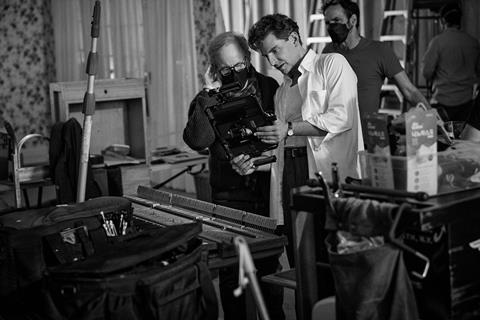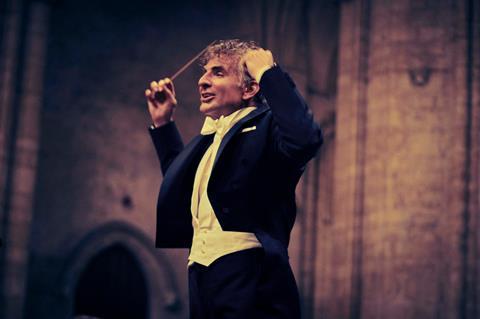Maestro director and star Bradley Cooper talks about why his biopic of iconic composer/conductor Leonard Bernstein connects to a lifelong personal obsession.

Growing up in Philadelphia in the late 1970s, early 1980s, Bradley Cooper watched Tom And Jerry cartoons on TV like any other kid — but one episode would prove to have a life-changing impact. It was entitled ‘The Hollywood Bowl’ and saw Tom conduct an all‑feline orchestra in a rendition of ‘Die Fledermaus’, only to have the performance interrupted by Jerry. Shortly after, Cooper asked for a baton for Christmas. He was eight.
“That was my favourite toy for years,” recalls Cooper, in London to promote his second feature as director, Maestro, a drama about legendary composer/conductor Leonard Bernstein — whom Cooper also plays — and his actress wife Felicia (Carey Mulligan). “I would spend hours and hours pretending to conduct. It provided a tremendous amount of joy. I was completely enthralled by it.”
As an adult, Cooper made a name for himself first as an actor in comedies (The Hangover) and dramas (American Sniper), then as a writer/producer/director with 2018’s A Star Is Born, which was nominated for eight Oscars and seven Baftas. But the desire to conduct never left him. So much so that, on learning Steven Spielberg was making a movie about a conductor, Cooper had his agent arrange a meeting.
Written by Josh Singer (First Man), the script was not just about any conductor. It centres on an extraordinary composer, conductor and all-round musical genius who wrote the scores to West Side Story and On The Town among other achievements. “I was in the middle of finishing A Star Is Born,” remembers Cooper, “and asked [Spielberg], ‘Is this something you think you’re going to do? If not, I feel I’ve found my centre as an artist with writing and directing, and I’m obsessed with conducting. Could I take it over and research it? I don’t know anything about Leonard Bernstein. But if there’s a movie there, would you let me take a crack at it?’”
Spielberg was happy to hand over the baton, but remained as producer through his company Amblin, alongside Martin Scorsese, Cooper and others. “What I didn’t know was the rights to the music were about to lapse,” Cooper explains. “Once Steven said, ‘Go for it,’ the next move was meeting [Bernstein’s] children, showing them A Star Is Born, then telling them I didn’t know what the movie was going to be about, but that I asked Santa Claus for a baton when I was eight. And they decided, okay. A couple of months later, I went back to them and said, ‘The movie’s going to be about your mom and dad.’ Which I know they were shocked by.”
Singer’s initial script was more of a traditional biopic but, as Cooper dived into research, studying footage, reading books and listening to hours of interviews with Bernstein and Felicia, it evolved into the story of a complex union between two people who were devoted to each other and had three children — even though Bernstein continued to have affairs with men. “This relationship came to the surface that was fascinating,” says Cooper, who worked with Singer on a new script. “There’s nuclear power in his music but [I felt this] could be a movie about marriage that could be potentially transcendent.”
Despite the critical and commercial success of A Star Is Born, Maestro was passed on by Warner Bros, for which Cooper had made that film and produced the $1bn-grossing Joker, as well as by Paramount and Apple.
“I was disappointed, but I understand why,” he says. “It’s a movie about a classical musician, half of it’s in black and white, in a 1.33:1 aspect ratio. And there’s six minutes in the middle where you’re watching a guy conduct classical music. But it was clear to me if I could pull it off, it could be something wonderful.”
Eventually, the movie found a home with Scott Stuber at Netflix, which gave the film a limited theatrical release in November before it reaches the streaming platform on December 20. “He was the only one who trusted me and believed in that idea,” says Cooper of the chairman of Netflix Film. “Thank goodness for him.”
The role required Cooper to undergo a dramatic on-screen transformation given that Maestro spans five decades, beginning with Bernstein in his 70s before flashing back to his early 20s. “That’s daunting on many levels, given how he evolved physically and vocally, smoking since he was 13,” Cooper says. “His voice dropped an octave, but he had the same melody.”
Total transformation

Cooper worked with dialect coach Tim Monich, whom he had met on American Sniper, “for eight hours a day, five days a week” over an extended period.
“He moved to New York,” continues Cooper. “I would take my daughter to school, then Tim would come over and spend the day. I would FaceTime with Carey, [Bernstein’s] children or Steven Spielberg and talk to them as Lenny. It was a wonderful time. The best preparation I’ve ever had.”
Once on set, Cooper continued to speak in Bernstein’s voice, even when addressing cast and crew. “I’m so grateful the actors were able to go about this process, which I understand is a unique thing,” he reflects. “I asked a lot of them to be okay with me, as Lenny, doing a scene with them, directing.”
Although Maestro is full of bold directorial flourishes, every so often Cooper shoots his actors in long, uninterrupted takes with the camera staying back, almost like theatre. One such scene is an argument between Bernstein and Felicia in their New York apartment, as Macy’s Thanksgiving Day Parade goes past.
“This movie is so much about public and private existences, and I always felt more unsafe being far away from something that’s disturbing, because that’s how I experienced it in life,” divulges Cooper. “Being far back, like my sister and I were, when our parents were fighting. I was never in between them. Luckily, Carey is so masterful at what she does, I was able to get what I wanted, to stay in this proscenium wide. If she hadn’t, I would have had to cut in and create something to make up for the fact the two actors weren’t able to hold the tension.”
Then there is the prosthetic make-up Cooper wears throughout. Much was made of his slightly elongated nose when the trailer first dropped; but in the film, it is not at all distracting. The daily process required Cooper to spend between two-and-half to five hours in the make-up chair each morning before filming. “I got to work with a great artist, Kazu [Hiro],” he says. “We were always trying to improve it. We joked at the end, should we go back and reshoot? Cause I was finally at the right weight. The thinner I was, the more human it looked.”
Cooper also devoted a great deal of time to working with Gustavo Dudamel, music director of the Los Angeles Philharmonic, and Yannick Nézet-Séguin, music director of the Philadelphia Orchestra, learning how to conduct the London Symphony Orchestra in a live rendition of Mahler’s 2nd Symphony — a central sequence that was shot over two days at Ely Cathedral, Cambridgeshire.
“The most terrifying thing I’ve ever done, in terms of a performance,” Cooper admits. “Because I knew it was the key to the movie.”















![[L-R]: Amanda Villavieja, Laia Casanovas, Yasmina Praderas](https://d1nslcd7m2225b.cloudfront.net/Pictures/274x183/6/4/1/1471641_pxl_20251224_103354743_618426_crop.jpg)



![[L-R]: Amanda Villavieja, Laia Casanovas, Yasmina Praderas](https://d1nslcd7m2225b.cloudfront.net/Pictures/100x67/6/4/1/1471641_pxl_20251224_103354743_618426_crop.jpg)





No comments yet